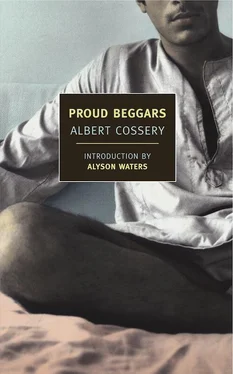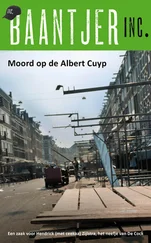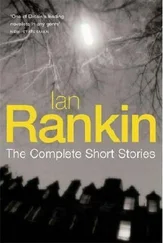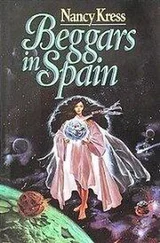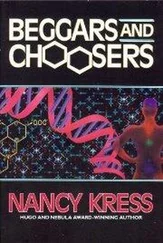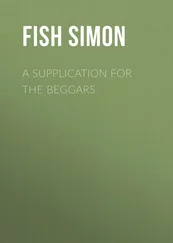He understood from her silence that her grand hysterical scene was over; he sat down on the bed, leaned over her, and began to caress her. She let him caress her hands, then her face, then her body. She seemed happy and relaxed; her eyes shone with a feverish luster. But this moment of abandon did not last long. She tore herself violently from her lover’s grasp and suddenly broke into sobs.
“What’s wrong, my darling?”
“It’s horrible! I can’t forget her. Poor Arnaba.”
“Calm down,” said El Kordi. “Don’t think about it anymore. You’re not going to bring her back by crying. We can’t do anything about it.”
“I wonder who could commit such an awful crime. And for nothing!”
“By Allah! I don’t know. But there’s no doubt it was an intelligent fellow.”
“What makes you say that? What’s so intelligent about killing a poor girl?”
“In any case, they’ll never catch him. Especially if they’re counting on that ignorant police inspector.”
“You saw him again? He questioned you again?”
“No, but I hope to see him again someday. I have a lot of things to teach him.”
“What things? Tell me?”
El Kordi smiled slyly.
“Things that have nothing to do with the crime,” he said. “It’s a personal affair between him and me.”
“I beg you, don’t get yourself in trouble. I know you.”
“I’m not a child,” El Kordi protested. “I’m not afraid of anyone. I can do what I want with that policeman.”
To tell the truth, this was just empty talk; Nour El Dine had ceased to be a fearsome enemy for him. Up to now, El Kordi had merely considered this motiveless murder as a personal matter, a kind of epic battle between him and the police. But a new character had now appeared in the drama, a character whom he had deliberately ruled out as a nonentity: the criminal. However, he did exist; Arnaba hadn’t strangled herself. El Kordi wondered if he knew him, because if he were a client of the whorehouse, he certainly would. He knew all the men who came to Set Amina’s. He diligently tried to remember each of them, but they were all so dull, so impalpable, that the idea of accusing them of a crime seemed highly ludicrous.
His reflections led him to envision a secret inquiry, though not for the purpose of catching the killer — El Kordi would never agree to turn him in. He simply wanted to learn the reasons for the man’s act. After all, since he hadn’t stolen anything, it might be a political crime. The motive: that’s what would be interesting to know.
He looked at his face in the wardrobe mirror, remembered the medicines locked in there, and turned his head away.
“Well! I’m going to undress. Make room for me in bed.”
“That’s all you think about,” said Naila.
There was bitterness in her voice.
“Off course it is, my love,” answered El Kordi. “What do you expect me to think about?”
“How can you love a sick girl like me? I’m so ugly now.”
“What does your physical beauty matter to me? You still don’t understand that it’s your soul I love.”
When it came to sleeping with a woman, El Kordi could say anything. Nothing could stop him. In this domain, even the wickedest of lies seemed indispensable to him.
Though hardly convinced by her lover’s profession of faith, Naila nonetheless kept silent. It was useless to question El Kordi’s extravagant words; she would never know the truth about his motives or the extent of his love. All the same, what a son of a bitch! To pretend that he loved her soul! That was a bit too much. She watched him taking off his clothes and putting them methodically on the chair. Was he undressing for her soul? Fool! Who would buy that! She almost burst out laughing, but contained herself. She went on staring at him with eyes transfixed by anxiety. She too was thinking about the killer. Her anxiety had begun the tragic moment she heard Set Amina’s cries and the girls’ terrified exclamations. In the solitude of her room, even before she had understood the meaning of the tumult, she had been filled with a dark foreboding. It was only later that she had established a connection between the crime and El Kordi’s presence in the house that very day. This simple coincidence, as well as the young man’s behavior during the questioning, had sufficed to create an unbearable doubt in her mind: What if he were the killer?
During the three days Naila hadn’t seen her lover she had vainly tried to get rid of this horrible suspicion. But El Kordi’s reticence and the mystery of his relationship to the investigating officer only strengthened her fears. She would have liked to question him, but didn’t dare.
El Kordi was now completely naked; even like this he retained his dignity, for he had forgotten to take off his tarboosh. All of a sudden he realized this, took it off, and placed it on the chair on top of his neatly arranged clothes. Then he lay down beside the young woman, took her in his arms, and held her protectively against his chest.
“Tell me it wasn’t you!”
“Me what, girl?”
“You who killed her.”
“What are you saying? You’re crazy!”
“All these days I’ve been thinking it might have been you. I was deathly afraid. So, it wasn’t you?”
“Of course it wasn’t me. What are you imagining? I didn’t kill anyone.”
Frowning, he reflected with Naila’s head resting on his shoulder. So she had suspected him of being the perpetrator of the crime. El Kordi was dismayed, but what most unsettled him was the diabolical idea that had begun to sprout in his brain. What if he let her think that he was the young prostitute’s murderer! What was he risking? It was an unexpected chance to clothe himself in romantic glory, to play the part of a shadowy hero.
He was so happy with his idea that he began to think of making love. Without moving he started to nibble at the young girl’s ear while murmuring joyous obscenities to her.
When he was ready to take her, Naila looked in his eyes and said, “Swear to me that it wasn’t you.”
“I swear to you. Now don’t worry. Let’s not talk about it anymore.”
But there was something like an invitation to doubt in the tone of his voice, an evident desire not to be believed. Naila was so clearly aware of this that the blood froze in her veins; for a long time she remained inert and rigid in his arms.
THE SORDIDNESS of the decor made him all the more sensitive to his feeling of having fallen low. This pastry shop was truly ignoble, but it had the advantage of being situated within the native quarter, in an area frequented only by stray dogs and the dregs of society. It was an ideal spot for the kind of meeting Nour El Dine was fond of; he’d chosen this one over several others to shelter his clandestine loves. Here, at least, he risked no indiscretion. True, his young friends didn’t share his point of view at all; they were scarcely happy to be invited to this unsavory hole that Nour El Dine persisted in calling a pastry shop, where they were served inedible cakes. Where was the pleasure? They wondered if Nour El Dine wanted to mortify them, and they strove to understand why. As a result, these rendezvous took on a sinister air, conducive to unhappy endings. Nour El Dine himself felt uneasy in these squalid surroundings. He deplored the circumstances that obliged him to hide as if he were a conspirator. But how else could he go about it? His police inspector’s uniform didn’t make things any easier; everywhere he went, he felt himself to be the target of all eyes. He would surely have been less noticeable walking around stark naked.
For greater safety, Nour El Dine had chosen a table at the rear of the shop. Seated across from him, young Samir maintained a stubborn, almost premeditated silence; since his arrival he hadn’t opened his mouth. On the table were two small plates each holding a vile-looking pastry. Neither man had yet touched his. It was always like this: they only ordered the pastry for the sake of appearances. They would have to be truly famished or at the end of their resources to resign themselves to ingesting that abomination.
Читать дальше
